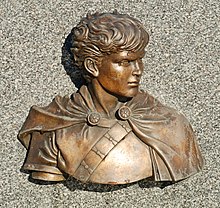Jacques Martin (comics)
This article needs additional citations for verification. (January 2010) |
| Jacques Martin | |
|---|---|
 Bust of Alix on the tomb of Jacques Martin in Céroux (Ottignies-Louvain-la-Neuve, Belgium) | |
| Born | 25 September 1921 Strasbourg, France |
| Died | 21 January 2010 (aged 88) Orbe, Switzerland[1] |
| Nationality | French |
| Area(s) | Cartoonist, Writer, Penciller |
| Pseudonym(s) | Jam, Marleb |
Notable works | Alix Lefranc Jhen |
| Awards | full list |
Jacques Martin (25 September 1921 – 21 January 2010) was a French comics artist and comic book creator. He was one of the classic artists of Tintin magazine, alongside Edgar P. Jacobs and Hergé, of whom he was a longtime collaborator. He is best known for his series Alix. He was born in Strasbourg.
Biography
[edit]After pursuing engineering studies as a young man, Jacques Martin began in 1942 to draw his first comic stories. In 1946, following the end of the War, he travelled through Belgium in search of an editor for his work. Soon afterwards he met Georges Remi (aka Hergé) with whom he collaborated on several albums of The Adventures of Tintin (and more specifically on Tintin in Tibet and The Red Sea Sharks) while working on his own albums. It was from Hergé that he learned of the ligne claire style and, under Hergé's guidance, began to use it in his own work. He would later be considered one of the great five of the ligne claire style, along with Hergé, Edgar P. Jacobs, Bob de Moor and Willy Vandersteen.[2]
In 1948, he created Alix, his most famous series, published in the magazine Tintin, whose adventures - extremely well researched - occur in Roman antiquity. This historic comic soon became one of the most popular of the genre and went on to be published in several countries worldwide.
The story Le spectre de Carthage won the award for best French realistic comic book at the 1978 Angoulême International Comics Festival.
Martin went on to create other characters, beginning with the contemporary journalist Lefranc in 1952. Much later he created others in collaboration with various partners, namely the medieval architect Jhen (initially entitled Xan) in 1978, the French revolutionary officer Arno in 1984, the Athenian Orion in 1990, and the Egyptian Keos in 1992.[3] In 2003, he also started a new series - Loïs set in the court of Louis the sun king of France.
In 1998, due to failing eyesight, Martin left the drawing of Alix to Rafael Morales.[3] Alix continues running with great success. Martin died on 21 January 2010.[4]
Awards
[edit]- 1978: Angoulême Best French Realistic Work, for Alix: Le spectre de Carthage [5]
- 2003: Prix Saint-Michel Grand Prix[6]
References
[edit]- ^ "Jacques Martin, le père d'Alix, décède à l'âge de 88 ans" (in French). France24. 21 January 2010. Retrieved 30 January 2013.
- ^ Mouchart, Benoit. "Hergé Son of Tintin". Archived from the original on 2007-10-07.(in French)
- ^ a b "Jacques Martin". Comiclopedia. Lambiek.
- ^ "Archived copy" (in French). Tribune de Genève. 21 January 2010. Archived from the original on 29 January 2010. Retrieved 21 January 2010.
{{cite news}}: CS1 maint: archived copy as title (link) - ^ toutenBD. "Le palmarès 1978" (in French). Archived from the original on 2012-02-05.
- ^ ComicsFestivalBelgium. "Comics Festival Belgium 2003". Archived from the original on 2007-10-17.(in French and Dutch)
External links
[edit]- Jacques Martin biography in Evene (in French)
- Jacques Martin publications in Belgian Tintin Archived 2007-02-07 at the Wayback Machine, French Tintin Archived 2007-04-09 at the Wayback Machine BDoubliées (in French)
- Jacques Martin albums Bedetheque (in French)
